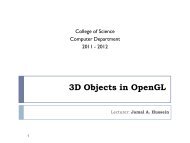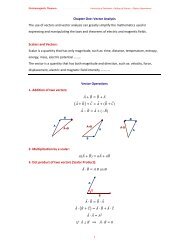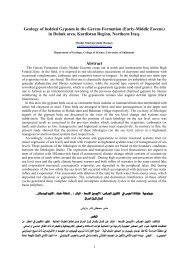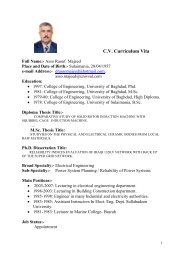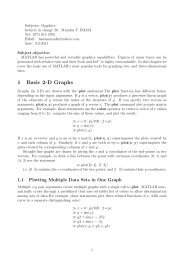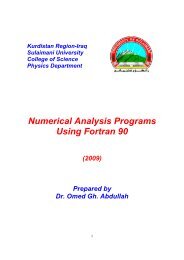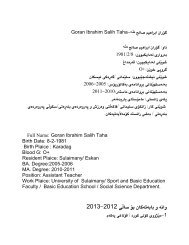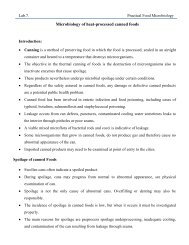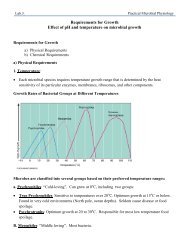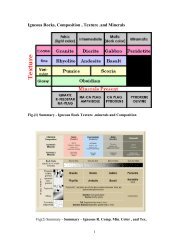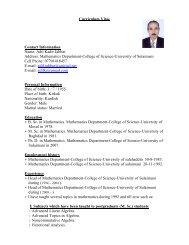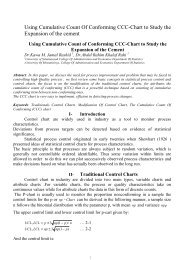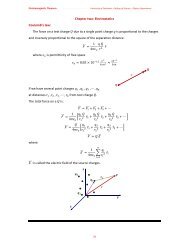Grammatical Aspect in English and Kurdish - University of Sulaimani
Grammatical Aspect in English and Kurdish - University of Sulaimani
Grammatical Aspect in English and Kurdish - University of Sulaimani
Create successful ePaper yourself
Turn your PDF publications into a flip-book with our unique Google optimized e-Paper software.
grammatical aspect. This expla<strong>in</strong>s why <strong>in</strong> <strong>Kurdish</strong> simple aspect is<br />
grammatically unmarked.<br />
(30) a. darom<br />
b. m<strong>in</strong> ésta darom.<br />
While <strong>in</strong> progressive aspect, the prefix –da which precedes the verb stem is<br />
considered an aspect marker, <strong>in</strong> that case all present verb stems are<br />
classified under progressive aspect .Hence the present tense morpheme is<br />
with<strong>in</strong> the verb stem itself.<br />
7- Conclusions<br />
<br />
<br />
1. In both languages the terms time, tense <strong>and</strong> aspect are closely<br />
<strong>in</strong>terrelated. Time is a semantic notion; aspect <strong>and</strong> tense are grammatical<br />
notions. They are grammaticalisations <strong>of</strong> time. Tense refers to the time <strong>of</strong> a<br />
situation while aspect <strong>in</strong>dicates the duration <strong>and</strong> the non duration <strong>of</strong> the<br />
action.<br />
2- In both languages, two ma<strong>in</strong> types <strong>of</strong> aspects can be realized: marked<br />
<strong>and</strong> unmarked. The former refers to those aspects which are realized by<br />
grammatical morphemes while the latter are those types <strong>of</strong> aspects which<br />
are not realized by any grammatical markers.<br />
3. In <strong>English</strong>, there are three grammatically marked aspects which are<br />
determ<strong>in</strong>ed by perfect, progressive <strong>and</strong> perfect progressive aspects while<br />
there are two grammatically marked aspects <strong>in</strong> <strong>Kurdish</strong>. They are<br />
determ<strong>in</strong>ed by perfect <strong>and</strong> progressive aspects.<br />
4. <strong>English</strong> has four types <strong>of</strong> aspects: simple, perfect, progressive <strong>and</strong><br />
perfect progressive while <strong>Kurdish</strong> has only simple, perfect ad progressive<br />
aspects.<br />
5. In both languages the grammatical aspect markers are <strong>in</strong>dicated by<br />
grammatical morphemes.<br />
6. In <strong>Kurdish</strong>, two types <strong>of</strong> the prefix –da can be realized:<br />
-da which precedes the present verb stems which is a present tense<br />
morpheme <strong>and</strong> it is not regarded as an aspect marker ,<strong>in</strong> that case aspect is<br />
realized by lexical elements such as time adverbs.<br />
-da which precedes the verb stem is an aspect marker which determ<strong>in</strong>es<br />
the duration or the non-completion <strong>of</strong> the action , <strong>in</strong> this case ,all present<br />
verb stems are classified under progressive aspect <strong>and</strong> the present verb<br />
morpheme is with<strong>in</strong> the verb stem itself.<br />
7- In both languages, the aspect types can be conceptualized as perfective<br />
or imperfective depend<strong>in</strong>g on the completion or the non – completion <strong>of</strong> the<br />
action.<br />
3/<br />
BÑoÐG+/--6Òg?i@Ô+%/2&Ïg@½e+ÑÁ@¾â̺kÒÙÁ?iÒg@¡Ù}



